How Will Gilson’s Amba Aims to Redefine Fast-Casual Dining
With rose petals and rotisserie chicken, the new Eastern Mediterranean counter-service spot from the Puritan & Co. chef soars into East Cambridge.
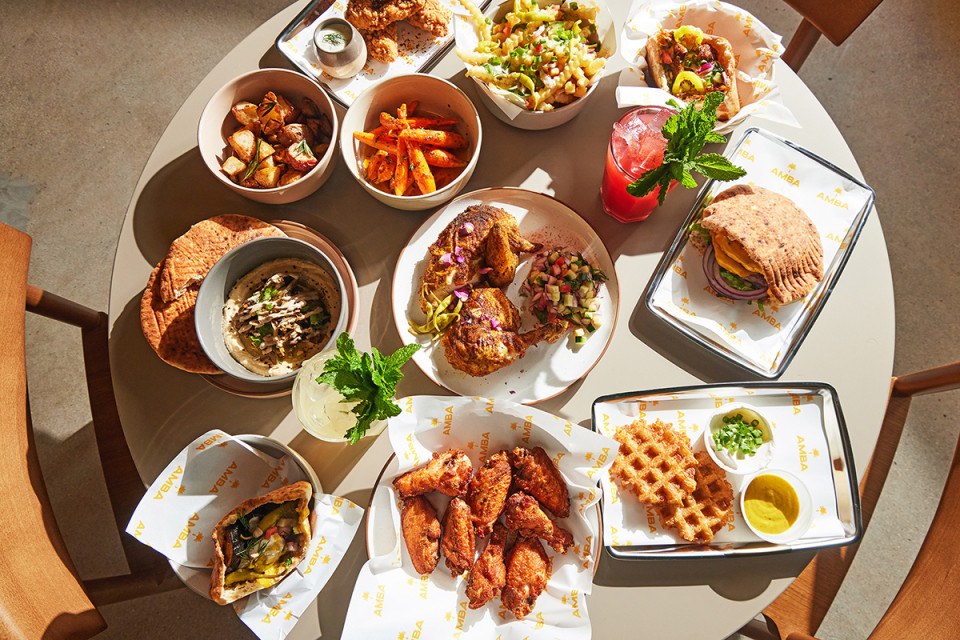
Photo by Brian Samuels
Chef and restaurateur Will Gilson knows the last four years have changed how people eat out. Sure, restaurants are still restaurants. But diners are also looking for communal spaces to offset work-from-home isolation, and maybe treat themselves to a proper lunch while also preparing for a Zoom. Quitting time might signal drinks with a friend, or prompt the question, “What should I make for dinner?” That’s why the James Beard Award semi-finalist’s latest venture, the Eastern-Mediterranean-influenced Amba, is a multifaceted endeavor mindful of those shifting lifestyle needs. Opening today within East Cambridge’s forthcoming First Street Market, the fast-casual spot serves multiple functions: part breakfast café; part all-day restaurant with sandwiches, salads, and glorious rotisserie chickens; and part co-working-meets-counter-service space, where you can tuck in for hours before grabbing takeout to bring home.
Gilson and the Cambridge Street Hospitality Group, which the born-and-bred New Englander runs with partners Ming-Tai Huh and Nick Vantzelfde, have already helped transform the Cambridge dining scene with Inman Square beauty Puritan & Co., which opened in 2013. Rather than rest on his laurels, Gilson opened three restaurants from mid 2020 to early 2021—the all-day Café Beatrice, New American spot the Lexington, and modern Italian eatery Geppetto—in the new Cambridge Crossing development (he also opened Puritan Oyster Bar next door to Puritan & Co. in 2023). On the border of Boston, Cambridge, and Somerville, the area was literally a gravel pit before Gilson’s spots helped revive it into a community hub. So it’s no surprise that four years ago, when developer Leggat McCall Properties and the city of Cambridge had plans to reimagine the First Street Garage into a similar micro-neighborhood, they looked to Gilson for help and hired him on as a consultant. When the First Street Market opens later this year, it’ll be a bustling space for farmers markets, private events like weddings, seated dinners for 120 and lavish cocktail parties for 200, and more. But during the planning phase, Gilson suggested the project needed an all-day anchor space to bring in revenue. Cue him joining as a partner and dreaming up a café to lure in folks from the neighborhood, even during months when events slow down.
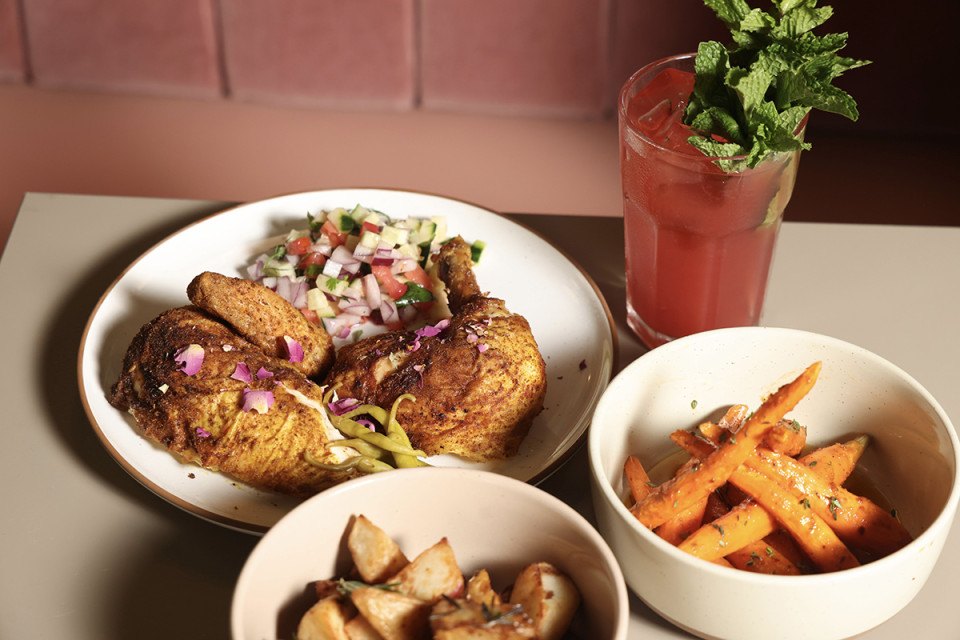
Photo by Brian Samuels
Sure, Gilson has ventured into counter-service before with Café Beatrice, but he knows that most people still have a kind of pre-pandemic mindset of the model. Of, say, running to a certain nameless fast-casual burrito and bowl restaurant where things have been sitting on a steam table for who knows how long, cramming a barbacoa bowl down your gullet, and hoofing it out of there as quickly as possible. Amble to Amba, and that’s not the vibe. “I hate how so many fast-casual restaurants have become these soulless venture-capitalist-backed machines that take your money and send you loyalty reminders,” Gilson says. “For us, we’re restaurant people. We like knowing your name when you walk in the door. We like that we’re gonna have a space next to this where you might throw your wedding. Yes, we’ll have to diverge a little bit with the way that we approach things as far as how quickly we can get food out. But when you step foot in Amba, it’ll feel like a place where you wanna spend time.”
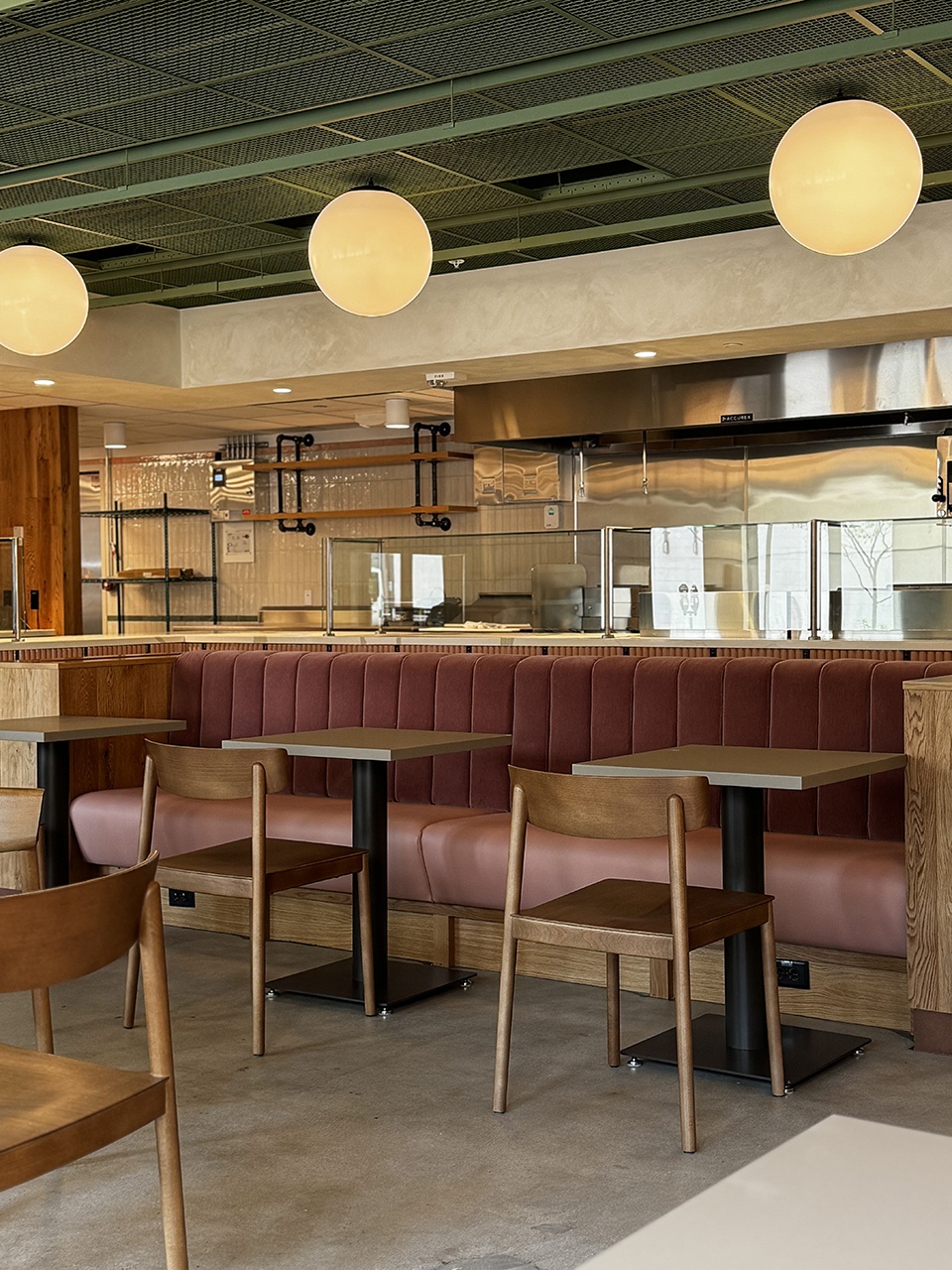
The interior of Amba / Courtesy
Fitting that the development of the 24-seat restaurant—with its handsome wood tones, industrial touches, and burnt cinnamon banquettes—spent a little extra time in the oven. The concept, too, is a product of Gilson’s long migratory path through multiple cuisines and is a bit of a return home. Gilson worked as a line cook at Best of Boston winner Oleana, Ana Sortun’s love letter to the Levant, from 2005 to 2007, and though he’s sometimes since flirted with Middle Eastern ingredients, Amba is a full-blown commitment to the cuisine. He also loved the idea of opening a rotisserie chicken restaurant, something he thought the neighborhood could use, but didn’t want to flock closely to Kendall Square poultry purveyor Shy Bird—a spot he enjoys. Most of all, he wanted to try something new.
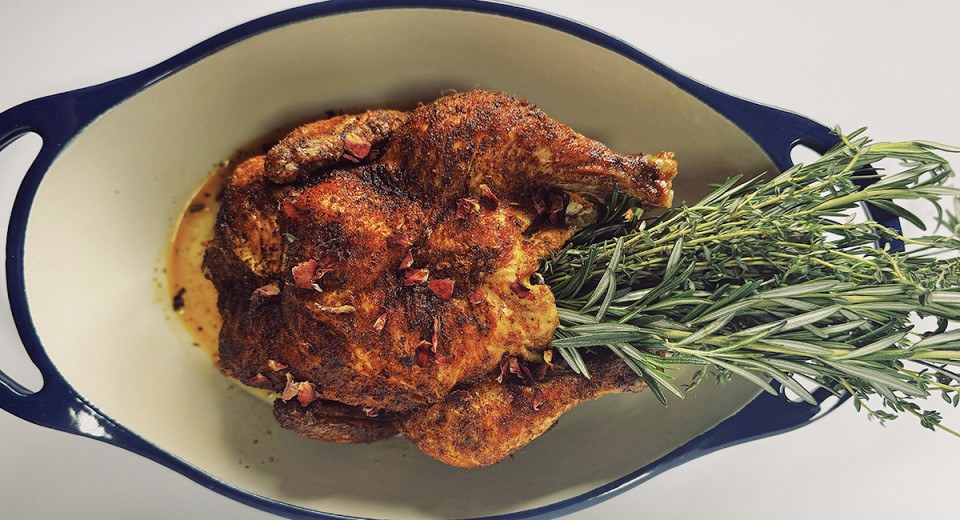
Courtesy
And try he did, in a big way—letting loose with an initial “brain dump” of ideas, then whittling them down over six months to a still-sprawling menu that features about two dozen plates plus a handful of mezze, sides, and scratch-made sauces. Joe the Architect designed Amba’s counter-ringed space, which features a bustling dining area in the middle, and more subdued spots around the edges were people will naturally gravitate for quieter meals. Gilson describes the restaurant’s namesake—a vivid orange-yellow and spicy condiment made of green mango that’s fermented and cooked in a sauce with toasted spices, garlic, and a dash bit of vinegar—as one of the most distinct things he’s tasted. “It has a very unique story,” he says of its origins. “It tells the tale of Iraqi Jews learning flavors in India and then moving their way through that part of the world, through Iraq, and then ending up in Israel.”
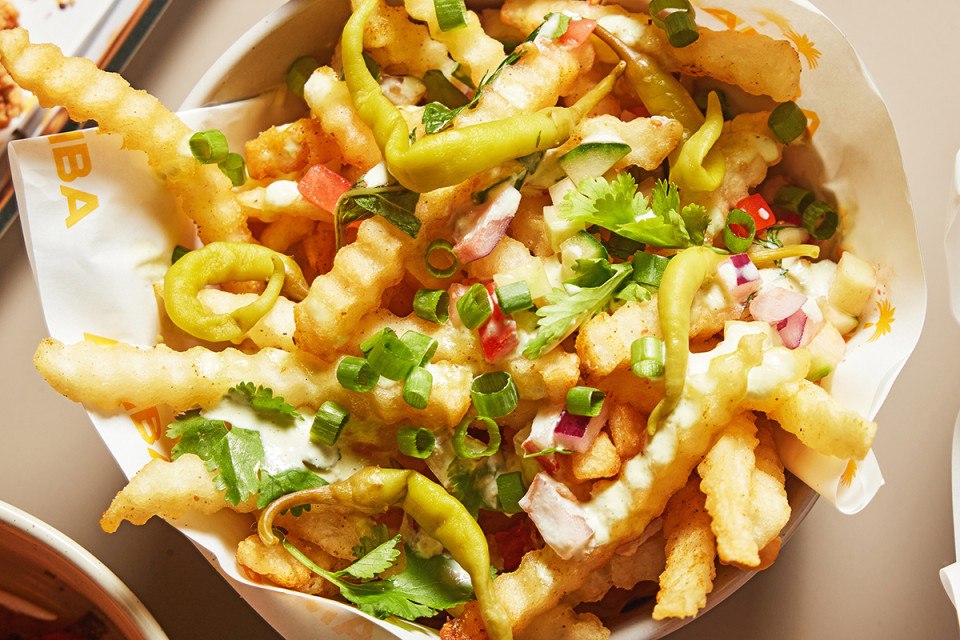
The spiced crinkle cut fries. / Photo by Brian Samuels
At Amba, culinary journeys begin with breakfast, with eight options to pair with La Colombe coffees. The breakfast shawarma features sesame sunny-side-up eggs with garlic sauce and herbs in a houses-made pita. This bite, along with others, features potatoes smothered in schmaltz, which is an ingredient made from rendered fat—in Amba’s case, from its rotisserie chickens—which is a common ingredient in Jewish cuisine. “We can sub in stuff if people are vegetarian, but I like getting the chicken and egg band back together,” Gilson says with a laugh. Add additional proteins like sausage to the pita or the breakfast wrap, which sees scrambled eggs, pickled peppers, cheese, and garlic sauce wrapped in a flakey, scallion-pancake-like bread called malawach. On the sweet side, the sugar-and-spice toast is a French-toast-like delight of cream-soaked challah tossed with a mixture of sugar, cardamom, cinnamon, and allspice. Executive pastry chef Brian Mercury whips up baked goodies—including lemon bars with pistachio and rose—for morning commuters breezing in for a quick bite.
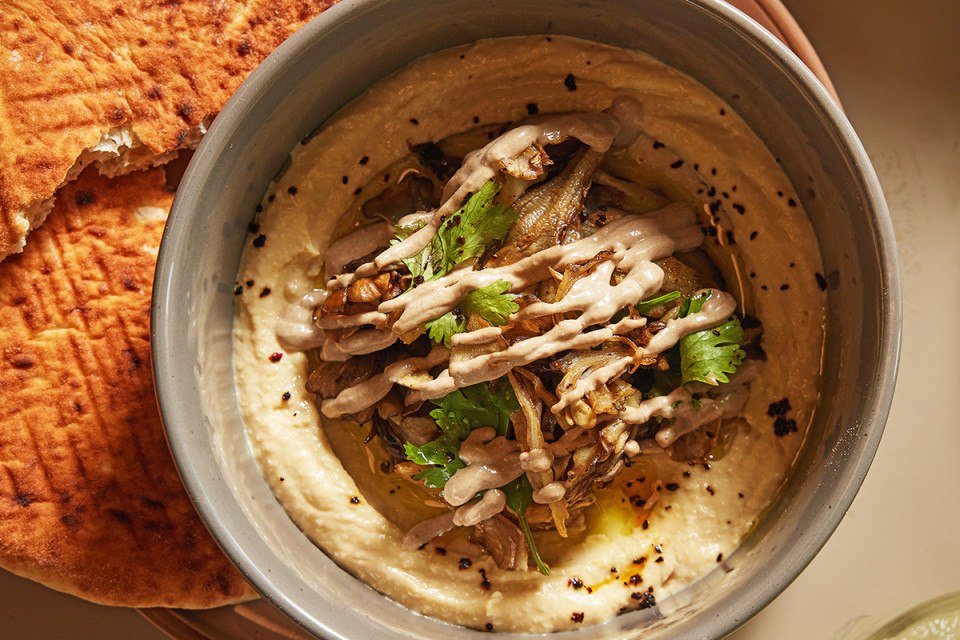
Photo by Brian Samuels
The lunch and dinner menus are the same, showcasing snack-y appetizers (latkes; chicken wings coated in a crave-able powder of dehydrated chicken stock and spices; fries that are a lovechild of poutine and shawarma), sandwiches (chicken salad and shawarma; a fried eggplant and boiled egg combo called sabich), salads (fattoush with a cooling yogurt; a cucumber, tomato, and feta salad with faro; a shawarma bowl with Persian rice), and rotisserie chicken with various sauces and sides. Among the mezze offerings, Gilson’s eggplant escalivada is similar to baba ganoush, but with the addition of tomato and roasted peppers. The mezze recipes are traditional, though elsewhere he knows when to wander. Take his matzoh ball soup, starring matzoh balls that owe their green hue to tons of dill. An unexpected hint of curry adds depth, too. “Mamaleh’s has one of the best ones out there,” Gilson says of the classic soup. “So I’m making sure that whatever I put forward isn’t trying to be similar. I want people to try something that feels a little different.”
Speaking of different, the “pita mac” (one of three burgers along with a cheeseburger and lamb burger, presented in quotes on the menu) “might be the dish that either makes me or breaks me because it’s just so different,” he says. Two beef patties, special sauce, and a host of toppings nestled inside a pita, the dish was inspired by the experience of eating shawarma: a nibble here and you taste tahini; a mouthful there packs a pickle-y punch; the last few bites are melds of all the ingredients. This burger eats the same way. Or as Gilson puts it, “That the last bite is just as good as your best bite.”
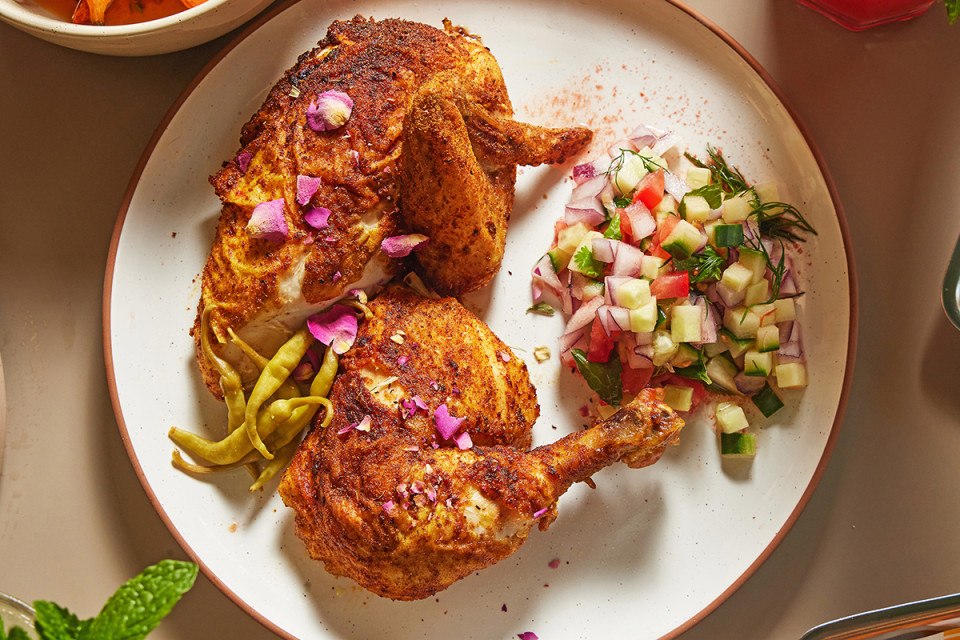
Amba’s rotisserie chickens are truly something special. / Photo by Brian Samuels
Yet it’s the herb-stuffed rotisserie chickens that deserve the most reverence. Yes, Gilson knows you can buy a bird for under ten bucks at the grocery store. But there’s no comparing plastic-bagged chickens under deli-section heat lamp to his beauties. Here, chickens first bathe in a lemon-and-fresh-herb brine for twenty-four hours, develop flavor in the fridge for another twelve, then get rubbed down with a secret spice blend that includes dried rose petals before slow roasting on the rotisserie. “When you open up the container, you smell the toasted spices and that nice finish of dried rose petals,” he says.
You’re absolutely welcome to order a chicken and nest in the restaurant for a while. But Gilson pictures a slightly different scenario: Busy parents flocking in for a chicken, some sides, and a bunch of sauces to take home for dinner. “That’s the stuff that makes me happy,” he says. “I’ve got two little kids. I live in the suburbs. Sometimes I think that when we make these restaurants, we’re making them and wishing that we had them near us.”
55 First St., Cambridge, ambacambridge.com; Open Tuesday through Saturday, 7 a.m. to 8 p.m.; breakfast is served from 7 a.m. to 11 a.m.; lunch and dinner are served from 11 a.m. to 8 p.m.
A version of this story was published in the print edition of the September 2024 issue with the headline, “Petals and Poultry.”




